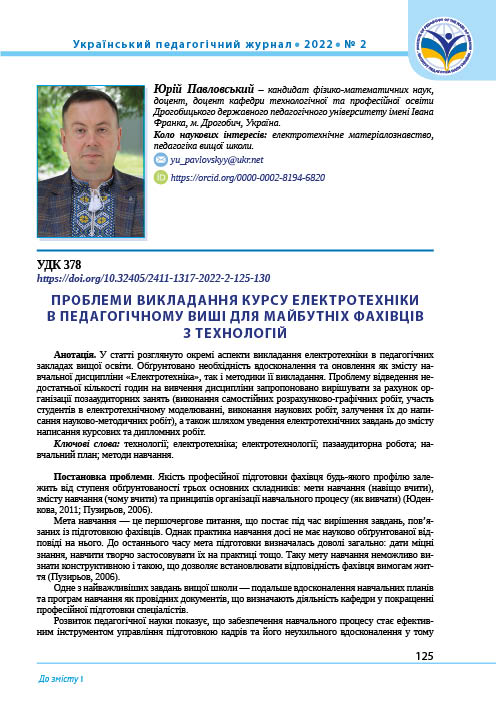Abstract
The article considers some aspects of teaching electrical engineering in pedagogical institutions of higher education for future specialists in technology. Based on the analysis of educational-professional training programs for bachelors in the specialty 014 Secondary Education (Labor Training and Technology) the need to improve and update both the content of the discipline “Electrical Engineering” and the methods of its teaching. The solving of the problem of allocating an insufficient number of hours for studying the discipline by organizing extracurricular classes (performing an independent search, calculation, calculation-graphic works, participation of students in electrical modeling, involving them in scientific and scientific-methodical works writing), and inclusion of electrical tasks in the content of writing term papers and graduation theses have been proposed. It has been stressed that the effectiveness of independent work on theoretical material can be ensured in the presence of appropriate educational and methodological developments on some important topics, such as: “Methods of Calculating Electric Circuits”, “Induction Motors”, “Modern Production Technology”, “Environmental Problem of Electricity Production» etc. In these manuals, special attention should be paid to worldview issues, the development of the relationship of electrical engineering with socio-economic processes, the dialectic of technical thought, inventions and the development of creative abilities. It should be borne in mind that the organization and temporary separation between different types of extracurricular and extra school work activities can lead to reduced activation of cognitive activity of students, involving them in conscious and purposeful mastery of holistic learning material. Thus, only a comprehensive approach to solving the problems of teaching electrical engineering in higher education institutions for non-electrical specialties can ensure the effective acquisition of knowledge, skills and abilities of future professionals they need in their further professional activities.
References
Юденкова, О.П., (2011). Створення навчальних програм на основі аналізу ринку праці. http://center-polygraph.org.ua/ua/project/newspaper/?pic=11
Пузирьов, Є.В., (2006). Кваліфікаційна характеристика як основа формування мети і змісту навчання в технічному вузі. http://novyn.kpi.ua/2006–3/08_Puziryjov.pdf
Шишкін, Г.О., (2014). Методична система формування інтегрованих знань з фізики в процесі підготовки вчителів технологій. Донецьк: ЛАНДОН-ХХІ.
Марков Д.Ф., Великдан Ю. В., (2018). Можливості вдосконалення процесу професійної підготовки майбутнього вчителя технологій. Молодий вчений. 57 (5). 64–67.
Шишкін, Г.О., (2012). Інтеграція фізики та електротехніки в системі підготовки вчителів технологій. Науковий часопис НПУ ім. М. П. Драгоманова. Серія 5. Педагогічні науки: реалії та перспективи. (34). 207–212.
Дідик, А., (2018). Використання інтерактивних методів при викладанні курсу «Електротехніка та електроніка» для майбутніх педагогів професійної освіти. Збірник наукових праць Кам’янець-Подільського національного університету ім. І. Огієнка. Сер. Педагогічн. 24. 100–102.
Pavliuk, L., (2020). Interactive Teaching Methods of Electrical Engineering in the Training of Future Teachers of Labor Training and Technologies. Professional Pedagogics. 2 (21). 92–99.
Матвійчук, А., (2009). Комп’ютерні програми на лабораторних заняттях з електротехніки. Трудова підготовка в закладах освіти. 14. 21–24.
Петрицин, І.О., (2013). Електротехнічна підготовка майбутнього вчителя технологій із використанням віртуального лабораторного практикуму. Молодь і ринок. 12 (107). 70–75.
Петрицин, І.О., (2017). Застосування комп’ютерного моделювання у процесі електротехнічної підготовки майбутнього вчителя технологій. Молодь і ринок. 1 (144). 60–64.
Пагута, М.В., Попович В. Д., Савка Л. В., Луців І. Л., (2021). Освітно-професійна програма «Середня освіта (Трудове навчання та технології, інформатика)». https://dspu.edu.ua/wp-content/uploads/2021/08/01.pdf
Iudenkova, O.P., (2011). Stvorennia navchalnykh prohram na osnovi analizu rynku pratsi. http://center-polygraph.org.ua/ua/project/newspaper/?pic=11 (in Ukrainian).
Puzyrov, Ye.V., (2006). Kvalifikatsiina kharakterystyka yak osnova formuvannia mety i zmistu navchannia v tekhnichnomu vuzi. http://novyn.kpi.ua/2006–3/08_Puziryjov.pdf (in Ukrainian).
Shyshkin, H.O., (2014). Metodychna systema formuvannya intehrovanykh znan' z fizyky v protsesi pidhotovky vchyteliv tekhnolohiy. Donets'k: LONDON-ХХІ. (in Ukrainian).
Markov D.F., Velykdan YU.V., (2018). Mozhlyvosti vdoskonalennya protsesu profesiynoyi pidhotovky maybutn'oho vchytelya tekhnolohiy. Molodyy vchenyy. 57 (5). 64–67. (in Ukrainian)
Shyshkin, H.O., (2012). Intehratsiia fizyky ta elektrotekhniky v systemi pidhotovky vchyteliv tekhnolohii. Naukovyi chasopys NPU im. M. P. Drahomanova. Seriia 5. Pedahohichni nauky: realii ta perspektyvy. (34). 207–212. (in Ukrainian).
Didyk, A., (2018). Vykorystannya interaktyvnykh metodiv pry vykladanni kursu «Elektrotekhnika ta elektronika» dlya maybutnikh pedahohiv profesiynoyi osvity. Zbirnyk naukovykh prats' Kam"yanets'-Podil's'koho natsional'noho universytetu im. I. Ohiyenka. Ser. Pedahohichn. 24. 100–102. (in Ukrainian).
Pavliuk, L., (2020). Interactive Teaching Methods of Electrical Engineering in the Training of Future Teachers of Labor Training and Technologies. Professional Pedagogics. 2 (21). 92–99.
Matviychuk, A., (2009). Komp"yuterni prohramy na laboratornykh zanyattyakh z elektrotekhniky. Trudova pidhotovka v zakladakh osvity. 14. 21–24. (in Ukrainian).
Petrytsyn, I.O., (2013). Elektrotekhnichna pidhotovka maybutn'oho vchytelya tekhnolohiy iz vykorystannyam virtual'noho laboratornoho praktykumu. Molod' i rynok. 12 (107). 70–75. (in Ukrainian).
Petrytsyn, I.O., (2017). Zastosuvannya komp"yuternoho modelyuvannya u protsesi elektrotekhnichnoyi pidhotovky maybutn'oho vchytelya tekhnolohiy. Molod' i rynok. 1 (144). 60–64. (in Ukrainian).
Pahuta, M.V., Popovych V. D., Savka L. V., Lutsiv I. L., (2021). Osvitno-profesiina prohrama «Serednia osvita (Trudove navchannia ta tekhnolohii, informatyka)». https://dspu.edu.ua/wp-content/uploads/2021/08/01.pdf (in Ukrainian).

This work is licensed under a Creative Commons Attribution-NonCommercial-ShareAlike 4.0 International License.


